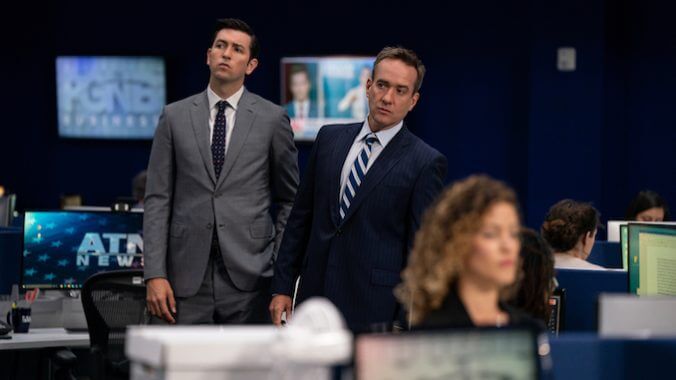Succession: On Mythmaking, Patricide, and Escaping the Belly of the Beast
Photo Courtesy of HBO
KENDALL: I thought I had an out. I could see it, I could… I could see the way markers… and I thought I could take us all out of it. (Succession Season 3, “All the Bells Say”)
As the legend goes, Jonah spent three days and three nights in the whale. What if it had been a lifetime? What if he’d been born there, in its warm, damp belly? Jonah descended into the beast with a vital advantage: memories of the sunny outside world. A child would know nothing. The roof of the whale’s mouth would be their sky, its flesh their earth.
A smart aleck could ask what they’d eat or how they’d breathe. In answer, I could task Jonah to scrape plankton from the teeth of the whale’s capillaries with a stick of driftwood. I could describe the special respiration of God’s special fish. I think most know better than to ask. Myths offer images of ourselves so clear that those questions seem impolite, like casting stones into a pool because we hate its reflection. It is into this magnificent, mythical claustrophobia that we find the Roys.
At the beginning of Succession’s third season, Kendall thought he was Zeus, a child planted by fate on the outside. He thought he’d gallop to the rescue, cut his siblings free, and show them a new way to live. Watching him try to reconstruct a “normal” life was an unholy spectacle: the “nights out” with hangers-on, the cheap humility, the birthday party… Did he really think normalcy could include the limousines, the rolodex, the name that opens doors to the talk show circuit? Does Prince Harry?
By the end of the third season, he realized that he’d never left Logan behind him at all. His messianic airs deflated, he was able to see his brother and sister as captives of the same jailor. That was the great leap forward.
The fourth season opener of HBO’s titan drama shows just how far they have to go. The siblings get into a bidding war with their father, and Roman has a moment of clarity that Ken and Shiv blow past: “Ten [billion]? Just to show that we’re really serious?” Ken’s cautionary tale will get a second verse, I think, but with an ensemble this time. They catch on slow, these Roy kids.
Then again, it’s always easier to see these things when you’re on the outside.
EWAN: Feting the king. Tacitus comes to mind… He’s made a wasteland and calls it an empire.
GREG: God, Tacitus. All killer, no filler with him. (Succession Season 2, “Dundee”)
Tacitus reads like a suicide note. In his Histories, he writes, “The secret of empire was now revealed, that an emperor could be made elsewhere than at Rome.” What a gracious way of saying that Rome was now openly a bandit nation, its leaders elected at sword-point. Being about three generations deep into this mess called the Roman Empire, Tacitus confined himself to cataloging its decline and making pithy remarks at imperial functions. Where was he when the temples of his republic were crumbling, when states were ready to revolt, or when minds were ready to reform?
Tacitus clearly perceived the beast and the depth of his predicament, but thought the effort of climbing out beneath him. How very Ewan Roy. Regardless of how often their flailing brings them full circle, the Roy children can at least imagine something more than the empire into which they were born—whether or not they can actually get there.